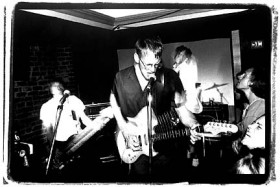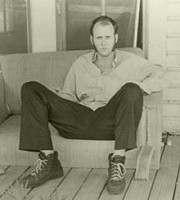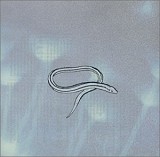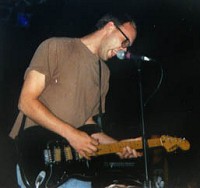Crooked Fingers: Deliverance in the Wasteland
Why Eric Bachman of Crooked Fingers is the Mad Max of our musical apocalypse
By: Mikel Jollett

The Apocalypse
Have you ever wondered where you'll be when the apocalypse comes? Eric Bachman hasn't. He knows. He'll be exactly where he began, where he is now, where he's always been. He'll haunt the same bars, explore the same territory, exorcise the same demons he's been screaming at since his days as the front-man of the indie-adrenaline-pumping, all discord and brilliance Chapel Hill-based Archers of Loaf. Back in 1994, he was all bite and meaning. Six foot four with a growling yell and a receding hairline crowning a be-speckled face relentlessly spitting arcane metaphors and hooks over intricate guitar riffs, bass chords, and powerhouse drumming. The energy was palpable. The talent, undeniable. Remember the not-so-distant musical environment of 1994: Nirvana broke. The Pixies were becoming a cult phenom (after they broke up, of course). Even Pavement was getting some air play. The elusive, capricious, forces of musical success were aligning in their favor: Archers of Loaf were the Next Big Thing.
Back in 1994, he was all bite and meaning. Six foot four with a growling yell and a receding hairline crowning a be-speckled face relentlessly spitting arcane metaphors and hooks over intricate guitar riffs, bass chords, and powerhouse drumming. The energy was palpable. The talent, undeniable. Remember the not-so-distant musical environment of 1994: Nirvana broke. The Pixies were becoming a cult phenom (after they broke up, of course). Even Pavement was getting some air play. The elusive, capricious, forces of musical success were aligning in their favor: Archers of Loaf were the Next Big Thing.
It was only logical that rock and roll, having given up the big hair and make-up of the 80's for the scrawny, wayward frame of a certain Seattle slacker; having sensed in him something legit, something alienated, something REAL for God's sake; having embraced his Seattle cohort, milking them for all of their talent and market penetration and flannel and beanies and solipsistic soul-searching symbology; it was only logical that rock would take the next step and embrace the truly creative, the truly quirky, the truly talented likes of Sonic Youth, Archers of Loaf, Superchunk, and Yo La Tengo. Archers of Loaf, and Eric Bachman as singer/songwriter/guitarist/ tragic hero had found that most sad and ghostly quality of human dignities: potential.
But that was 1994, and we all know where the story goes from there. In short, the apocalypse came. The bomb went off. Only, unlike a nuclear chain reaction, it didn't happen in an instant. It happened slowly, as Wall Street and Wal-Mart, KROQ and K-Mart slowly caught wind of just what was exciting all those pimply-faced kids in cold-weather garb. No, the bomb didn't go off when Kurt Cobain died. It didn't go off when Doug Martsch quit Screaming Trees. The atomic bomb that destroyed it all had nothing do to with Pearl Jam refusing to bargain with MTV or Ticketmaster.
No, the day the bomb went off was the day Macys printed a "grunge" section in it's winter catalog. A "grunge" section butted right up against the lady's lingerie section and the kids winter sale. A slickly-packaged "grunge" section complete with sleeveless flannels, colorful ski hats, boots, and torn jeans worn by the same cheery, anorexic models that showcased criss-cross bras and mohair pants-suits just three pages over. The apocalypse came because from that moment on, you weren't a "fan", you were a "target".
Just think, your green and red ski hat that you loved--that you wore to your first Lemonheads show, the hat that symbolized your freedom, your alienation, your very ability to flawlessly sing every single word to "Wave of Mutilation" while quoting Sigue Sigue Sputnik and rejecting all things "mainstream"--they bought that god-damn hat. That was the day the h-bomb destroyed popular music. Archers of Loaf, and your hat, didn't stand a chance.
It was not video. Marketing killed the radio star.
Because from that day forth, the lines between art and product, between angstful rebellion and talentless, brainless schlock (see Limp Bizkit)--those lines were forever blurred. How do you participate in an underground whose ethic is shamelessly mined by goateed marketers trying to mass-market alienation and slackerdom? The scene spirals out of control. The marketers take over. Talent--raw, creative energy and talent--is no longer the issue. The issue is sales. Because, hey guys, it looks like we can fake the realism too. We can fabricate the underground scene. We can prop up pretty crooners, dress them in a flannel, teach them a power chord and we got ourselves a hit, boys. Once it's just product, there's a very short, slippery slope between Nirvana and Britney Spears.
It seems that the bellowed refrain from the 1995 AOL song The Greatest of All Time was as much a funeral dirge as an epitaph for all of the quirky, creative indie scene: "the underground is overcrowded." Indeed. The underground was overcrowded and now the whole edifice has been blown to bits.
We live in a barren, post-apocalyptic musical wasteland. And just like water or gasoline in a Mad Max film, rarely is there a fresh voice, or a true talent that pops up in the charts. It's all pre-packaged, market-tested detritus. Even the songs of the "rebel" crowd sound like the product of a round-table advertising discussion: "I know, in this song, I'll get, like, real mad in the end and ask for something to break." "Love it, Fred. The kids'll go nuts..." Indie artists and indie fans are the lost children of Thunderdome, hoping for a scrap of artistic bread, a drop of stolen creative water.
Crooked Fingers is Mad Max
 That is why Eric Bachman is my hero. He is the Mad Max of our wind-swept desert of freaks and geeks, traversing the country from coast to coast, writing, singing, recording, performing when he gets the chance. He is the tragic figure resisting the oppressive hordes of tyrants and thieves, sticking to his guns, living on his instincts.
That is why Eric Bachman is my hero. He is the Mad Max of our wind-swept desert of freaks and geeks, traversing the country from coast to coast, writing, singing, recording, performing when he gets the chance. He is the tragic figure resisting the oppressive hordes of tyrants and thieves, sticking to his guns, living on his instincts.
Archers of Loaf broke up two years ago. Actually "petered out" is a better description. Bachman would say that they broke up for the same reason they began: boredom. But, the world would not yield and all of the critics, dedicated fans, and musicians that loved all of the squeaks and pitches and dizzy rhythms could not save them from the financial reality: despite their brilliance, their ship could no longer "stay afloat". He could have easily quit at that point and became a producer (which he does occasionally) or a back-up musician in a more successful band or even gotten a "Job". He had as much reason to give up as any musician who'd given it the ol' college try. He'd been a critics darling for years, toured relentlessly, stuck to his indie label (Alias records) in the face of larger offers. He could have packed it in and slept well with the knowledge that he'd done everything he could. He didn't. Instead, he created Crooked Fingers, and with it some of the most powerful music in years.
Crooked Fingers first album, on which he is the sole consistent member/singer/songwriter /avatar is not only one of the best albums of the past few years made by any artist, it is by far the bravest. Brave--it's a rather strange adjective to apply to music that is neither political, revolutionary, nor profane. But brave it is. Where once there was screaming, discordant guitar, there is now euphonious violins and cellos. Where once there was middle eastern scales and rhythms, there is now, of all things, finger picking. Where once there was a guttural howl, there is a fervent, if damaged, singing voice. Where once there was abstruse metaphors, there's now a surprisingly personal and honest lyrical style. He does the most shocking thing of all you can do in an age of irony: he means it.
That makes him genius and it also makes him a tough sell for the suits at the RIAA. They are the warlords of our wasteland, devilishly perpetuating our oppression by marketing the crap that keeps filling their pockets and assaulting our ears with endless saccharine cries of "baby, baby." But he does not give in.
Bachman's music is brave because instead of compromising his past sound to a more marketable niche or simply giving up, he decided instead to go deeper into the well. That is, he decided, in essence, to say fuck it all and just make music. When listening to the album, one gets the sense that Bachman is not constrained by any desire or habit to conform to an existing musical form. Instead, he is content to go where the music takes him.
Throughout the first album, guitar heroics are sacrificed for the sake of good, solid, consistent, (important?) song-writing. The cast of characters and metaphors includes consistent references to people setting themselves on fire, late night drinking, deep holes, ashes, blackness, devils, and oceans. The cacophonous, gothic writing style is classic Bachman. What's new is the cogency of the songs. The music draws you into Bachman's world with precisely placed melodies set against dark images. Charles Bukowski meets Tom Waits meets something cruel and beautiful and utterly haunting.
At times, as in the upbeat "New Drink for an Old Drunk" he sounds like Neil Diamond doing a Pogues cover: a drinking song with a staccato American voice and relentless finger picking over a simple beat and, get this, a textured violin riff. Bachman, the perennial barfly croons autobiographically with well-placed strings of internal rhyme, "They kicked you around like a rodeo clown/ and it echoed through town, they were beating you down..." One gets the sense that the author's self-awareness is, itself, a blight as he sings in celebration "hours pass by half-forgotten/ night turns black 'cause it's rotten/ and we slide right to the bottom..." Listening to the catchy tune, you can't help but hum along with the dark-laced lyrics. One senses a lineage more with Leonard Cohen than with Steven Malkmus or Frank Black.
In "Juliette" a pared-down, lo-fi melody about a girl who has set herself on fire, a guitar and bass riff gives way to an eerie ebo off in the distance that plays it's lonely notes like a funeral horn. Bachman is at his best here when storytelling about the passion-plays he concocts in his mind. This is headphones-at-full-blast-in-a-dark-room-on-a-rainy-day kind of music and it's awe-inspiring. Bachman sings confidently through vocals chords ruined from years of yelling and barking over the noise of the indie-rock club scene. His voice communicates that he's a survivor with a story to tell about what he's seen. The fucking guy sounds like the embodiment of the failed hopes of 90's indie rock.
Nowhere is this more prevalent than the confident melody and singing of "Black Black Ocean" which again experiments with strings and finger picking with an added distorted synthesizer track that follows the arc of the song like a broken motor. Again, the autobiographical nature of the material rises up, "I can't swim and I can't breathe/ Drowning on this drunken sea/ Black black ocean creeping tide/ Rise over me and then leave me to die." Fatalism, futilism, helplessness over one's fate--these themes, not surprisingly, populate both the current songs and life of Eric Bachman.
 The new album, "Bring on the Snakes", out February 20th on Warm Records, continues this focus on song writing. Bachman opens the album with "The Rotting Strip" a catchy lovelorn song about the futile relationships of the self-loathing. The song, though originally arranged, has the storytelling arc and chord structure of a Bruce Springsteen romp, replete with nostalgia for time gone and time served. "Some say, the price you pay/ is far to much to spend/ but they don't know the cost is fair/ if for awhile it keeps your heart from crumbling," Bachman croons thoughtfully. There is a beer-hall, drunken revelry to these songs that seem to celebrate the flaws, mundanity and insanity of their protagonists, "you were a two-bit tramp/ I was a low-life lying scamp/ we were a bad lay/ coming undone..."
The new album, "Bring on the Snakes", out February 20th on Warm Records, continues this focus on song writing. Bachman opens the album with "The Rotting Strip" a catchy lovelorn song about the futile relationships of the self-loathing. The song, though originally arranged, has the storytelling arc and chord structure of a Bruce Springsteen romp, replete with nostalgia for time gone and time served. "Some say, the price you pay/ is far to much to spend/ but they don't know the cost is fair/ if for awhile it keeps your heart from crumbling," Bachman croons thoughtfully. There is a beer-hall, drunken revelry to these songs that seem to celebrate the flaws, mundanity and insanity of their protagonists, "you were a two-bit tramp/ I was a low-life lying scamp/ we were a bad lay/ coming undone..."
The album peaks in the fourth track. "Sad Love" takes the pared-down arrangements, despondent lyricism, and folk arcs and uses them to masterfully capture a somber mood. This is perhaps the most earnest song Bachman has ever written and in it he abandons all indie conventions and simply tells his story. He sings, "On the day you came I swear I'd never felt so drunk/ and stumbling I tried to bring you down to where I'd sunk."
"There is a Blue Light" the last track on the album also masterfully captures this mood and allows Bachman to show us why he abandoned all that convention in the first place. The rest of the album is more hit and miss. It's filled with similar situations and song structures that approach but don't quite reach the bar Bachman set for himself on the first album. The songwriting is powerful but, at times, not as focused as elsewhere. Still, the overall effect is indelible and immense.
The Interview
"I would be Ricky Martin, if I could do what I want to do," Bachman says in a phone interview from his home in Atlanta. He is more reserved, more humble than I expect. He is vague about his inspirations, mainly, it seems because he vague and unassuming about his entire life. "On tour, I'm fortunate enough to make a little money because some people come to my shows." I ask him why he makes music. He says, "It was the first thing I was good at. I tried basketball but that didn't work out. Music gave me a sense of place, a social circle. I guess you could say I found a home."
 I ask him about the upcoming Crooked Fingers release Bring on the Snakes due out February 20th. He says that the album is more personal than the first, more focused. "I had only two songs written by August. From then, I wrote fifteen songs in eight days." Remarking on the album's arrangements he says, "There are no strings, just guitar and destroyed sound on tape with vocals and sound pads." I ask him why he didn't use more of the strings that were so effective on the first album. He replies quickly, "I did it on that record. So why would I do it again?"
I ask him about the upcoming Crooked Fingers release Bring on the Snakes due out February 20th. He says that the album is more personal than the first, more focused. "I had only two songs written by August. From then, I wrote fifteen songs in eight days." Remarking on the album's arrangements he says, "There are no strings, just guitar and destroyed sound on tape with vocals and sound pads." I ask him why he didn't use more of the strings that were so effective on the first album. He replies quickly, "I did it on that record. So why would I do it again?"
On the subject of the new album which was recorded in Pittsboro, North Carolina with the help of producer Bryan Paulsin he says, "I like the freedom of doing whatever. Of being able to pull in anyone to play." He feels the same way about touring. While touring with band-mates Joe Jamison (drums & upright bass) and Robert Martin (banjo, pedal steel, violin), they attempt to, "Play a different thing every night. This is by design. The shows are fluid."
I ask him if he sees Crooked Fingers as a direct reaction to the noise and discord of the Archers of Loaf. He pauses a moment, "it's not a rock thing...I'm just interested in doing something else. I want to be different all the time." Was it frustrating to be part of such a hyped band that never "made it"? He replies humbly, "I never took our success seriously. We weren't as big as other indie bands at the time. With Crooked Fingers, I don't want to be an indie rock band. I don't know what that means anyway. I like Tom Waits more than Sebadoh." There is very little pretension in his approach. His is music without a business plan.
The conversation moves to music with a business plan. Responding to a question about pop music and its itinerant trappings, Bachman says thoughtfully, "I don't like the music business. I like music. I have no problems with major labels. I just have a huge problem with people telling me how to communicate through music." He is philosophical and detached about pop music, "There's music," he says in a solemn moment, "then there's entertainment. Britney Spears isn't trying to make music as I see it."
His nonchalant countenance belies not only his immense talent but the fact that he could've been famous, rich, successful if he had just been willing to compromise his musical sensibilities. But he didn't. Not because he wasn't able to or because he had some personal aversion to the notion of selling out. He didn't try it because it didn't even occur to him. And that's the point. Unlike so many others that play instruments and sing on tape: He is not a businessman, or a model, or a marketing professional, or a cult leader, or doped-up bad boy. He's an artist. And, just like any other tragic hero, his greatest strength is also his greatest flaw. It is both the reason he is so brilliant and the reason he has yet to find serious success.
He tours for money. He plays small indie clubs filled with 100-150 die-hard fans that know every lyric. He writes the songs the whole world ignores. His is not airtight music "to get you through the workday". His songs will ruin your mood even as they remind you that life is beautiful and terrible and fragile and tragic. He is more Emily Dickinson than Robert Frost, more Van Gogh than Picasso: an undiscovered talent working alone leaving a legacy of penetrating work for future generations to (hopefully) find.
His label, Warm Records, run by Brian Causy (formerly of Man...or Astroman?) has all of two other acts. Both southern indie-ish fare. And Bachman, ever non-cognizant, just continues to play and tour and write and travel...like Mad Max: because he doesn't know what else to do. Maybe he will find commercial redemption for his struggle, maybe he won't. Until then, he brings precious cargo through the current musical wasteland that all of us children of Thunderdome must, for now, endure.

